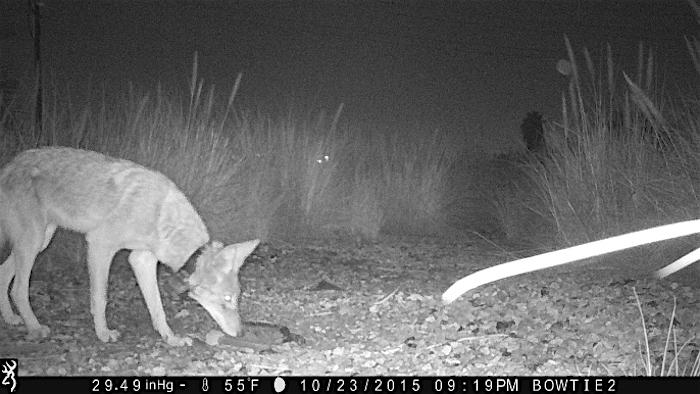
What do coyotes like on their menu at Santa Monica Mountains National Recreation Area?/NPS
More than a decade ago, National Park Service researchers collected coyote scat from 14 sites in and around the Conejo Valley in California. They wanted to understand the diet of local coyotes. Researchers are now going back to those same sites to repeat the study and see what has--or has not--changed.
The first study, from May 2001 thru July 2003, found that Conejo Valley coyotes ate rabbits, pocket gophers, woodrats, and mice. Native and fallen backyard fruit, too, and in very rare cases, a domestic cat.
But what are coyotes eating today? Wildlife ecologists hope to learn that with the help of the public and are looking for area residents to volunteer with the Coyote Scat Team at local monthly scat dissection events.
“Team members will get to see first-hand what local coyotes are eating,” said Justin Brown, a National Park Service wildlife ecologist with Santa Monica Mountains National Recreation Area. “And their work will contribute to local science that could help reduce human-coyote conflicts.”
The results will do more than update the previous Conejo Valley study. Findings from here, which is suburban and surrounded by large natural areas, will be compared to a diet study in the Los Angeles basin, where coyotes deal with more concrete, traffic, people, and fewer open spaces. Over 60 people have volunteered on the team in the city, collecting more than 1,300 scats since the project started in June 2016.
The first event for Conejo Valley area residents will be a dissection training, held on March 4 from 10:30 a.m. to 2:30 p.m. in Thousand Oaks. Subsequent dissection events will be held on the first Saturday of each month. Those interested in joining the team should email [email protected] to sign up.
Background
Since 1996, the National Park Service has been studying carnivores in and around the Santa Monica Mountains to determine how they survive in an increasingly fragmented and urbanized environment. During the course of the study, biologists have studied more than 340 bobcats, 150 coyotes, and 50 mountain lions.
Coyotes are medium-sized canids that inhabit most of North America. They are in the same taxonomic family as domestic dogs, foxes, and wolves.
Coyotes in Southern California are often the subject of negative media attention, but serious coyote conflicts with humans are rare. To reduce the likelihood of a negative interaction with a coyote, residents should be careful not to feed wildlife, either intentionally or unintentionally. Learn more about co-existing with coyotes from the California Department of Fish and Wildlife and the National Park Service.


 Support Essential Coverage of Essential Places
Support Essential Coverage of Essential Places







Add comment